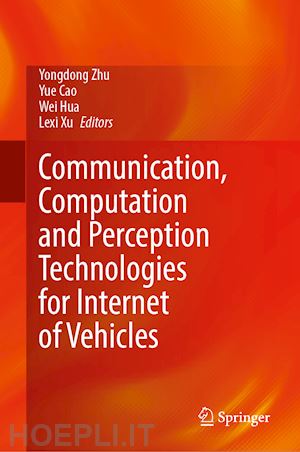
Questo prodotto usufruisce delle SPEDIZIONI GRATIS
selezionando l'opzione Corriere Veloce in fase di ordine.
Pagabile anche con Carta della cultura giovani e del merito, 18App Bonus Cultura e Carta del Docente
This book focuses on the design, management, and cybersecurity of connected and autonomous vehicles under the umbrella of the Internet of Vehicles. Both principles and engineering practice are covered, from the design perspectives of communication, computing, and perception to ITS management. An in-depth study of a range of topics such as microscopic traffic behavior modeling and simulation, localization, V2X communication, cooperative cloud-edge computing, and multi-sensor fusion for perception has been presented, while novel enabling technologies such as RIS and blockchain are introduced. The book benefits researchers, engineers, and graduate students in the fields of intelligent transport systems, telecommunications, cybersecurity, and autonomous driving.
Chapter 1:Modeling Microscopic Traffic Behaviors for Connected and Autonomous Vehicles.- Chapter 2: ITS Traffic Management with Connected Vehicles: an overview.- Chapter 3: Evolution of Wireless Communication Technology for V2X Assisted Autonomous Driving.- Chapter 4: 5G Meets V2X: Integration, Application, Standard and Industrialization.- Chapter 5: Enabling Reconfigurable Intelligent Surface for V2X Communication Systems.- Chapter 6: Real-time Object Detection for ITS Applications.- Chapter 7: 3D Scene Perception for Autonomous Driving.- Chapter 8: Multi-sensor Fusion for Perception in Complex Traffic Environments.
Yongdong Zhu received the bachelor’s degree from Xi’an Jiaotong University, Xi’an, China, in 1997, and the Ph.D. degree from the University of Essex, Colchester, UK, in 2007.
He is currently a research scientist with Interdisciplinary Innovation Research Institute, Zhejiang Laboratory, Zhejiang Province, China. His current research interests include next-generation mobile communication, mobile edge network architecture, vehicular communication networks, and Internet of Things.
Yue Cao received his Ph.D. degree from the Institute for Communication Systems (ICS) formerly known as Centre for Communication Systems Research, at University of Surrey, Guildford, UK, in 2013. Further to his Ph.D. study, he had conducted research as a fellow at University of Surrey and an academic faculty at Northumbria University, Lancaster University, UK, and Beihang University, China; and he is currently the professor at Suzhou Institute of Wuhan University and School of Cyber Science and Engineering, Wuhan University, China. His research interests focus on wireless network, cybersecurity, and transport control under the umbrella of ITS. He has been the associate editor of IEEE Access, Springer EURASIP Journal on Wireless Communications and Networking, KSII Transactions on Internet and Information Systems, etc.
Wei Hua received the Ph.D. degree in applied mathematics from Zhejiang University. He is currently a senior research expert of Interdisciplinary Innovation Research Institute, Zhejiang Laboratory. His current research interests include autonomous driving, intelligent simulation, digital twin, reinforcement learning and AI-based algorithms, and related works that can been applied to intelligent transportation, smart city, smart community, etc.
Lexi Xu received his Ph.D. degree from School of Electronic Engineering and Computer Science, Queen Mary University of London, London, UK, in 2013. Dr. Xu is now a senior engineer at Research Institute, China Unicom. He is also a professor (part-time) at Beijing University of Posts and Telecommunications, as well as an industrial tutor at NHU, SAU, and SUT. He has published more than 100 technical papers, as well as 1 book and 4 international conferences proceedings. He is also a China Unicom delegate in ITU, ETSI, 3GPP, and CCSA. His research interests include big data, self-organizing networks, smart mobility, ITS, satellite system, radio resource management in wireless system, etc.











Il sito utilizza cookie ed altri strumenti di tracciamento che raccolgono informazioni dal dispositivo dell’utente. Oltre ai cookie tecnici ed analitici aggregati, strettamente necessari per il funzionamento di questo sito web, previo consenso dell’utente possono essere installati cookie di profilazione e marketing e cookie dei social media. Cliccando su “Accetto tutti i cookie” saranno attivate tutte le categorie di cookie. Per accettare solo deterninate categorie di cookie, cliccare invece su “Impostazioni cookie”. Chiudendo il banner o continuando a navigare saranno installati solo cookie tecnici. Per maggiori dettagli, consultare la Cookie Policy.